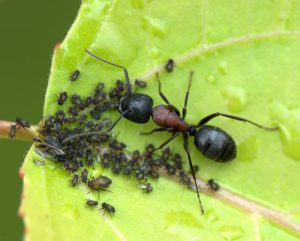The Ant/Aphid Connection
By Chris Williams on July 1, 2011.
Q. My 6 year old son pointed out all of the ants and aphids on the azaleas by our deck. The aphids don’t seem to be bothered by the ants. He wanted to know why the ants don’t eat the aphids. I told him I’d ask a pro.
A. Your observant son has found one of the classic symbiotic relationships between insects, and one that has existed for millions of years. The ants don’t bother the aphids because they have a very special mutually beneficial relationship that is both complicated and fascinating. The aphids excrete a sugary liquid which the ants feed on. The ants even stroke the aphids or “milk” their aphid cows with their antennae to stimulate them to produce more of the liquid which is called “honeydew.” In return, the ant farmers protect the aphids from predators and parasites. The ants will even move their aphid herd to more suitable host plants and find them safe places to hibernate where they will protect the aphids’ eggs during the winter. They might chew off the aphids wings so that the aphids can’t migrate. Some aphid species even live inside the ants’ colonies and are totally dependent on the ants.
The honeydew that the ants crave is a sweet, sticky substance that is exuded from the anal end of aphids and certain other plant-sucking insects such as mealybugs, scale insects, whiteflies, and planthoppers. Honeydew is basically digested plant juices and is a high sugar, vitamin-rich food that ants love.
 Problems with certain ants around buildings can often be traced to ants feeding on honeydew from aphids in nearby trees, shrubs, or on foundation plantings. About 75% of our common pest ants have some association with aphids. Some of the pest ants that feed on honeydew are the Argentine ant, carpenter ant, ghost ant, and white-footed ant. As a result of this beneficial relationship, populations of both the ants and the aphids can increase. When ants are tending aphids on plants near a house, the ants may start to forage into the house as well. Household ants can sometimes be tracked right back to the aphids outside.
Problems with certain ants around buildings can often be traced to ants feeding on honeydew from aphids in nearby trees, shrubs, or on foundation plantings. About 75% of our common pest ants have some association with aphids. Some of the pest ants that feed on honeydew are the Argentine ant, carpenter ant, ghost ant, and white-footed ant. As a result of this beneficial relationship, populations of both the ants and the aphids can increase. When ants are tending aphids on plants near a house, the ants may start to forage into the house as well. Household ants can sometimes be tracked right back to the aphids outside.
In some cases, an indoor ant problem can be controlled not by treating inside at all, but by controlling aphids or other plant-sucking insects on plants outside. Conversely, controlling ants will also control aphids as they will lose their protective benefactors. Look closely at other nearby plants for aphids (or put your son on it!), especially if you see ants moving up and down trunks or stems. Aphids usually cluster along the stem or on the undersides of the leaves. One nonchemical way to keep ants from reaching the aphids in trees is to apply sticky tape barriers (available from your local plant nursery) around tree trunks.